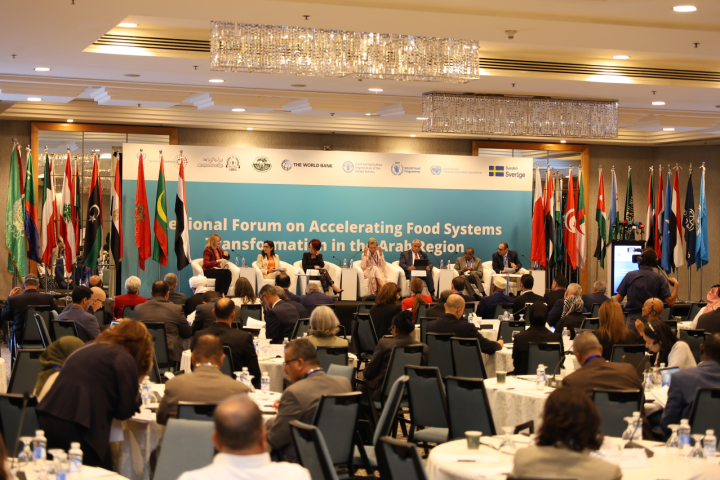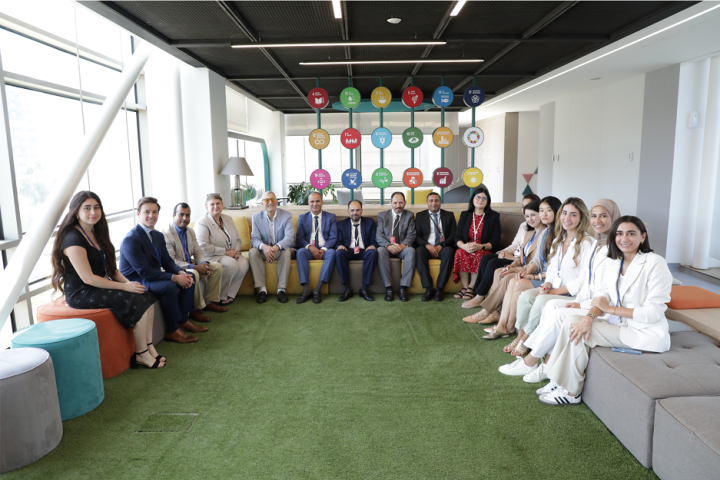Beirut, 26 September 2017 (Communication and Information Unit) -- United Nations Under-Secretary-General and Executive Secretary of ESCWA Mohamed Ali Al-Hakim today said, “the Arab region is expected to witness a continual increase in average temperatures, with more hot days accompanied by changes in monthly rainfall levels. Extreme weather indicators show the possibility of more frequent harsh weather conditions, such as droughts and floods. Given these findings, he noted that there is an urgent need to strengthen the region’s capacity to tackle climate change challenges, through capacity-building, knowledge and technology transfer, and institutional and financial support.”
Al-Hakim was speaking this morning before a crowd of regional and international ministers, diplomats and experts in the fields of Environment, Water and Development at the opening of the “High-Level Conference on Climate Impact Assessment and Adaptation in the Arab Region” which was held at the Beirut-Sin El-Fil Hotel under the auspices of Lebanese President of the Council of Ministers, Saad Hariri, represented by Parliament Member Amin Wahba. The Conference will continue until Thursday, 28 September 2017.
Al-Hakim said, “ESCWA efforts are consistent with the 2030 Agenda for Sustainable Development, which aims to provide a decent life for all and to ensure social justice, the sound management of natural resources and environmental protection. The Agenda sets out 17 Goals to direct global work towards the good of mankind and the planet.” He added, “the Paris Agreement came into effect in 2016, aimed at mitigating global warming by limiting average global temperature increases to less than 2 degrees Celsius above pre-industrial levels. To date, 166 States have ratified the Agreement, including 12 Arab countries. Ratification reflects a commitment by parties to practices that mitigate the effects of climate change. In this context, ESCWA plays an active role regionally by supporting member States in developing national plans and policies, and in the exchange of information and expertise to provide the best negotiating conditions in international meetings on climate change.”
In addition to Al-Hakim’s speech the opening session also saw statements by Stefanie Scharf, Head of Development Cooperation at the Embassy of the Federal Republic of Germany in Lebanon; Mikael Staaf, Deputy Head of Mission, Embassy of Sweden in Damascus and Beirut; Rafik Ali Saleh, Director General of Arab Center for the Study of Arid Zones and Dry Lands (ACSAD); Ahmed Aboul Gheit, Secretary-General of League of Arab States (LAS, represented by Djameleddine Djaballah, Director of LAS Environment, Housing and Water Department. The ceremony was presented by Roula Majdalani, Director of ESCWA Sustainable Development Policies Division.
Scharf
In her statement, Stefanie Scharf said “in the water sector we see climate change in action. Whether drought or flood -both have adverse consequences for people and for nature. Yet, water is essential for our existence, the sustainable management of eco-systems and therefore fundamental to all economic development. Above all, it is vital in agriculture, which is currently responsible for about 70 per cent of all water use. In this regard, it is absolutely necessary to take a regional perspective since climate change doesn’t stop at borders. We need a regional approach to complement our individual efforts and put them in a broader geographical and strategical perspective. That is why Germany supports the Adaptation to Climate Change in the Water Sector in the MENA Region Programme (ACCWaM) and the “Assessment of the Impact of Climate Change on Water Resources and Socio-Economic Vulnerability in the Arab Region” (RICCAR project).”
Scharf commended partnership between Germany and the regional framework noting that the conference covers the achievements derived from Paris Agreement which occurred at the regional and national levels.
Staaf
For his part, Mikael Staaf, said, “Climate Change impacts are transboundary. Climate Change does not have any borders and it will leave no one unaffected. Therefore, there is a strong need for transboundary dialogue and actions to combat the negative impacts we are facing and foreseeing. Sweden is proud to be part of RICCAR’s regional initiative supporting regional partnerships and joined actions for an economically, socially, and environmentally sustainable region with regards to Climate Change and water resources. For the MENA region, the Swedish government adopted a new development cooperation strategy in 2016. The strategy is implemented during five years with a financial commitment of 232 MUSD. The fact that Sweden has had regional strategies for cooperation with the MENA region since 2006 gives us a strong platform for continued engagement. The overall objective for Sweden’s MENA strategy is to contribute to strengthened democracy, increased respect for human rights, and sustainable development that improve the prospects for peace, stability and freedom in the region. Development Cooperation Agencies need to engage and promote regional integration, since integration and collaboration can have a strong impact on the development and well-being of the people in the region. This is why the Swedish MENA strategy takes a regional approach, meaning that we see the need for countries and neighbors in the region to cooperate. Such cooperation would lead to mutual understanding, respect, common solutions to challenges, and ultimately economic prosperity, environmental sustainability and peace.” Staaf also gave an idea about his government’s strategy with regard to the Syrian crisis.
Ali Saleh
In his statement, Rafik Ali Saleh said, "based on the results of the Arab Center's studies carried out over the past five years, in collaboration with ESCWA and other regional and international organizations, on climate change in the Arab region, the available climatic data analysis indicated that the Arab region has seen an increase in temperature, with an average of 1.25 degrees Celsius during the past 50 years.” He added, “as for precipitations, the analysis of the recorded data indicates that the Levant region will witness a decrease in precipitations as well as in the western regions of the Atlas Mountains, where the rainfall rate has reached 150 mm during the past 50 years, while the southern regions of the Sahara witnessed an increase in the rainfall rates, which reached in the Nouakchott station 125 mm during the same period. "
Djaballah
The final statement was delivered by Djameleddine Djaballah who said, “our understanding of the risks of climate change and how to enable the region to prepare and deal with it stems from our conviction in the economic sector of the League of Arab States and the specialized councils on water, environment, housing and agriculture that climate change, such as food security, water security and security in general, are challenges of a global and regional nature. Thus, it is not useful to deal with them in a non-regional or non-country-based manner. Therefore, as far as challenges are concerned, it is also an opportunity to enhance Arab cooperation and integration from the scientific and technical point of view, and above all at the level of regional development institutions and projects. "
He also said, “RICCAR Initiative and the establishment of partnerships and pivotal projects on the subject of climate change is a model for productive partnership because it came in response to a request from the Arab Ministerial Council for Water. The results of the project were presented regularly to the Council and the councils.”
He concluded, "this kind of partnership is the future and we must work together in a harmonious and open way to maximize the benefits that we can get out of experiences and funding opportunities, and to build on the strengths of all partner organizations that believe in regional action in dealing with climate change."
Following the opening session, the Arab Report on Climate Change Assessment was launched. The report was handed over and welcomed by the ESCWA Executive Secretary and the League of Arab States to the Chair of the 9th Session of the Arab Ministerial Water Council, Minister of Water Resources of Iraq Hassan Janabi, and the Chair of the 33rd Session of the Arab Permanent Committee for Meteorology and Chairman of the Board of Directors of the Egyptian Meteorological Authority Ahmed Abd Elaal Mohamed. The issuance of the report is in response to resolutions adopted by the Arab Ministerial Water Council, Arab Permanent Committee for Meteorology, and the ESCWA Ministerial Session. The report was introduced by ESCWA on behalf of the RICCAR partners.
Background
The Regional Initiative for the Assessment of Climate Change Impacts on Water Resources and Socio-Economic Vulnerability in the Arab Region (RICCAR) is the outcome of the first Arab Ministerial Declaration on Climate Change (2007), which recognized the potential impacts that climate change may have on development in the Arab region. The Declaration called for a comprehensive assessment of the potential impacts of climate change on the most vulnerable developing countries, including Arab States, as well as the need to identify priorities and implement climate change adaptation and mitigation programs at the national and regional levels.
RICCAR strategically bridges the science-policy interface by building regional capacity and conducting climate change assessments that inform regional priority setting, policy formulation, positioning and decision-making through a highly consultative and cooperative process.
RICCAR is implemented through a collaborative partnership involving 11 partner organizations, namely the League of Arab States, ESCWA, the Arab Center for the Studies of Arid Zones and Dry Lands (ACSAD), the Food and Agriculture Organization of the United Nations (FAO), Deutsche Gesellschaft für International Zusammenarbeit GmBH (GIZ), the Swedish Meteorological and Hydrological Institute (SMHI), the United Nations Environment Programme, the United Nations Educational, Scientific and Cultural Organization (UNESCO) Cairo Office, the United Nations Office for Disaster Risk Reduction (UNISDR), the United Nations University Institute for Water, Environment and Health (UNU-INWEH), and the World Meteorological Organization (WMO). In addition to the resources provided by the partner agencies, funding is provided by the Swedish International Development Cooperation Agency (Sida) and the German Federal Ministry for Economic Cooperation and Development (BMZ), which financially support RICCAR through the Adaptation to Climate Change in the Water Sector in the MENA Region (ACCWaM) project.
RICCAR is structured around four pillars of work consisting of: (a) a baseline review and set-up of a regional knowledge hub; (b) an integrated assessment consisting of impact assessment and vulnerability assessment components; (c) awareness raising and information dissemination; and (d) capacity building and institutional strengthening. ESCWA served as coordinator of the regional initiative, and provides regular reporting to the Arab Ministerial Water Council and Arab Permanent Committee on Meteorology on RICCAR-related activities.
*****
For more information:
Nabil Abu-Dargham +961-70-99 31 44; email: dargham@un.org
ECIU email: escwa-ciu@un.org
For more ESCWA news, please visit:
Website: www.unescwa.org Facebook: www.facebook.com/unescwa Twitter: @ESCWACIU



